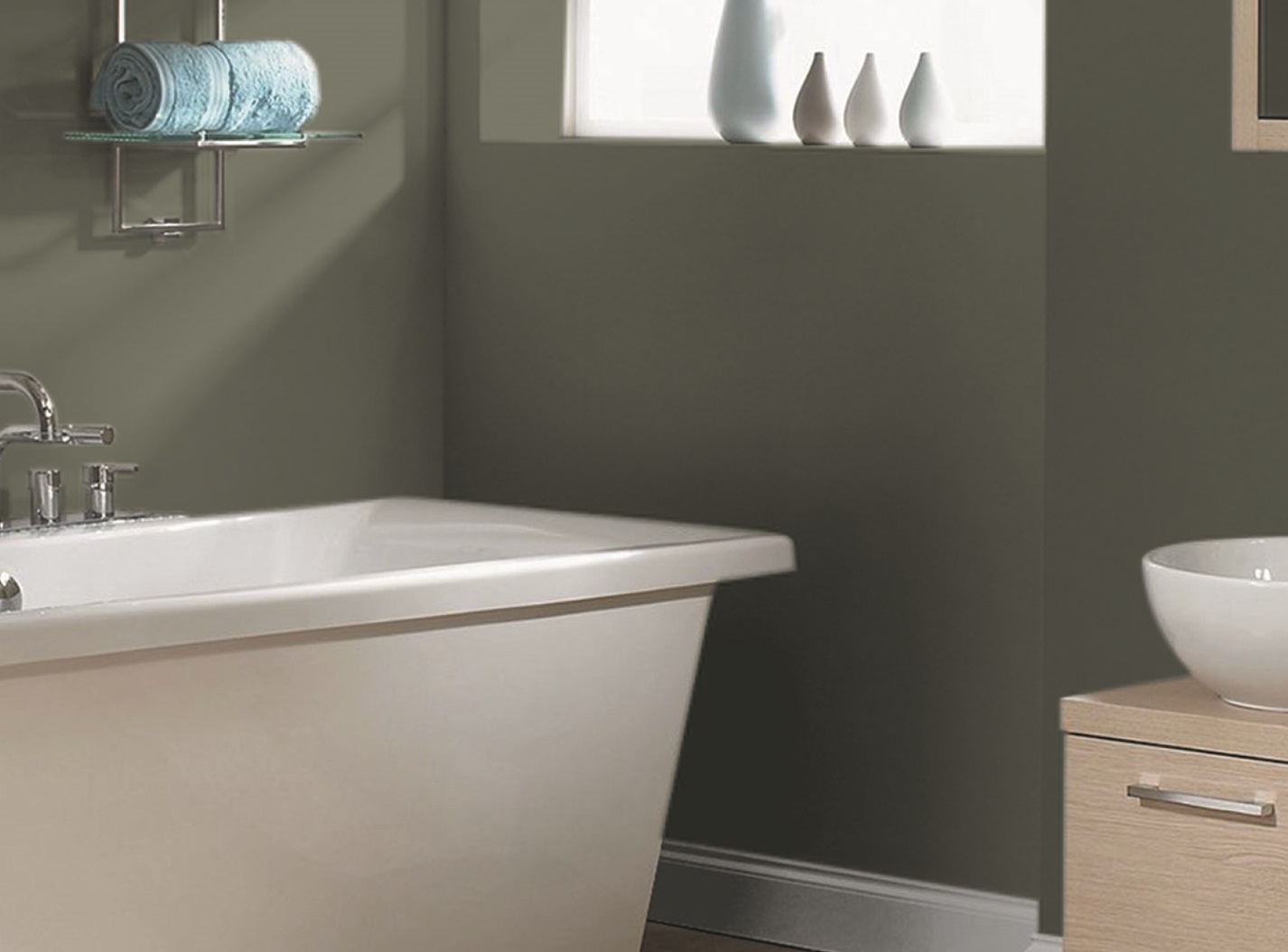This Sherwin-Williams Shade is the Perfect Choice for a More Relaxing Home — Here Are 6 Ways Designers Are Using It
This popular paint color is guaranteed to turn any room into a more serene space


The Livingetc newsletters are your inside source for what’s shaping interiors now - and what’s next. Discover trend forecasts, smart style ideas, and curated shopping inspiration that brings design to life. Subscribe today and stay ahead of the curve.
You are now subscribed
Your newsletter sign-up was successful
The paint colors in a room can have a huge influence on the way your space feels. Bright, saturated shades are great choices if you want a room that feels energizing and uplifting while softer, cooler tones generally make spaces feel more soothing and serene. If you're looking for a color that does the latter, one of Sherwin Williams' most popular shades should certainly be on your radar.
When it comes to the color trends of the last few years, green has been an enduring feature on any list. In fact, it's hard to find a modern home that doesn't feature a green paint idea somewhere given how livable and adaptable it is, and perhaps none more so than Sherwin-Williams' 'Dried Thyme'.
The household paint brand describes this sage-like hue as an 'organic, outdoorsy shade that feels fresh and sophisticated'. Its blue undertone makes it a cooler color which is perfect for statement accents, and designers and homeowners alike are loving the shade's relaxing properties, using it both inside and outside the home. Here, we spoke to the experts to find out the best ways to use the timeless color in your space.
1. Standout Kitchen Cabinetry
A post shared by HEARTHSIDE HOMES - KANSAS CITY HOME BUILDER (@hearthsidehomeskc)
A photo posted by on
Using color on your kitchen cabinets is an easy way to make your kitchen stand out and bring some warmth to the heart of the home. When it comes to kitchen cabinet color trends, you want to make sure that the color you pick isn't going to fall out of fashion anytime soon. Dried Thyme is a popular choice for kitchen cabinetry with its timeless nature and standout quality.
'The color almost has a firmness to it which looks very good on structured, larger pieces like cabinets and vanities,' says Tanner Huber, interior designer at Crawford Street Designs. The deep tone of the shade also makes the cabinets 'pop' meaning that your kitchen will feel characterful whilst still retaining a peaceful atmosphere.
Designers love using Dried Thyme for cabinetry due to how seamlessly it complements a wide range of kitchen countertops. The versatility of the color means that it will match up well with various popular kitchen countertop materials such as sleek marble or more rustic wood. 'Cabinetry always comes with countertops and Dried Thyme's almost "military-like" strength plays so well against movement and pattern,' says Tanner. 'Try different hardware on it to make any undertones really pop.'
2. Use as an Accent Color for a Striking Space
A post shared by Alicia Fawn Treasure (@a.freckled.fawn.design)
A photo posted by on
In more neutral rooms, implementing an accent wall can make the space feel more dynamic and playful. When going for an accent feature in any room, it's important to use a powerful color to ensure that it packs the punch that it needs in order to lift the room. Dried Thyme, being both bold and calming, makes for the perfect accent color. It functions either as a standout feature when paired with more neutral furniture or works well as a grounding color if the room has a busier feel.
The Livingetc newsletters are your inside source for what’s shaping interiors now - and what’s next. Discover trend forecasts, smart style ideas, and curated shopping inspiration that brings design to life. Subscribe today and stay ahead of the curve.
'The deep tone is very inviting especially when layered with deep woods and lighter, natural woven textiles,' says Laura Williams, lead designer at ATX Interior Design. When you use an accent color, it's important to think about how it will work with the rest of the room, too. As Laura says, Dried Thyme can be effective with both dark wood interiors as well as lighter more neutral interiors making it a fail-safe choice for accent features.
3. Create The Perfect Sun-Trap For Relaxation
'This shade provides the perfect balance between cool and organic without feeling saturated,' says Maria Vassiliou of Maria Zoe Designs. 'Use it in a room in your home where the afternoon sunlight comes in, and watch the walls glow.'
The depth of the color means that late afternoon sunshine catches on the green, giving the room a warmer feel. Think about positioning your use of the color, be it on a wall or on furniture, in front of natural light to benefit from the early evening glow. When flooded with light, the softness of this hue is enough to make you want to curl up in a comfy chair in a reading corner with a good book.
4. Bridge the gap between indoors and out
A post shared by Grey Wolf Painting (@greywolfpainting)
A photo posted by on
Dried Thyme is a hue made to be used out in nature and perfectly harmonizes with outdoor surroundings. It's a perfect color choice for those looking to create seamless indoor-outdoor living in their homes. 'As the name implies, Dried Thyme is garden-inspired and immediately makes one think of the outdoors,' says Tanner.
The versatility of the popular green shade strikes again when considering using it outdoors. The shade has been used to cover the entire exterior of houses, for bold deckings, or on outdoor furniture to create a calming, nature-inspired outdoor living area. 'The color is muted enough to be a main color, but it is also deep enough to offer substantial contrast against a lighter color, so the opportunities for garden accents are plentiful - shutters, doors, even patio furniture,' advises Tanner.
5. Transform Old Furniture
Similar to using the color for kitchen cabinets, painting furniture in the famed shade can add some elegance to old or plain-looking items in a room. The depth of the color means that any furniture coated in it automatically gains a luxuriousness to its look. 'A very ornate piece will lend itself to feeling a little more fancy and opulent,' says Tanner.
As Laura of ATX Designs suggests, layering the color with other materials helps to bring out the 'gorgeous earthy tone', making a room look and feel richer. Using a lighter woven textile like a rug under a repurposed table or dresser painted in Dried Thyme will help both features stand out. Or, perhaps update your closet or chest of drawers with Dried Thyme for a bolder accent feature in a room.
6. Make Your Artwork More Modern
A post shared by Ambiance Viera | Viera, Florida Interior Design (@ambianceviera)
A photo posted by on
When designing or renovating, designers work hard to make sure that the art in a home complements the room that it's in. It can be a tricky task to marry up the art tastes of a homeowner with the various styles, colors, and textures featured in rooms. Dried Thyme's versatility means that it's a perfect shade to complement artwork, matching up well with a wide variety of palettes and, often, seeming more like a strong neutral than a punchy color.
'Because of its reference to all-things-garden, the color tends to blend really well into other palettes when used in smaller amounts,' says Tanner. Her designer top tip is to paint frames in Dried Thyme. This can make traditional artwork look a little more modern or simply make wall art stand out in the room. 'If you have a gallery wall, painting some of the frames themselves in Dried Thyme can give off the classic look of a dark frame, but with a little touch of something softer,' says Tanner.
3 similar shades from our other favorite paint brands

Imogen is a freelance writer and student on the Magazine Journalism master's degree at City, University of London following her Modern Languages degree at The University of Exeter. She has written for lifestyle and popular culture magazines as well as wellness and sports magazines. She has a long-standing interest in interior design and London architecture and is a firm believer in the power of bold wallpaper.



